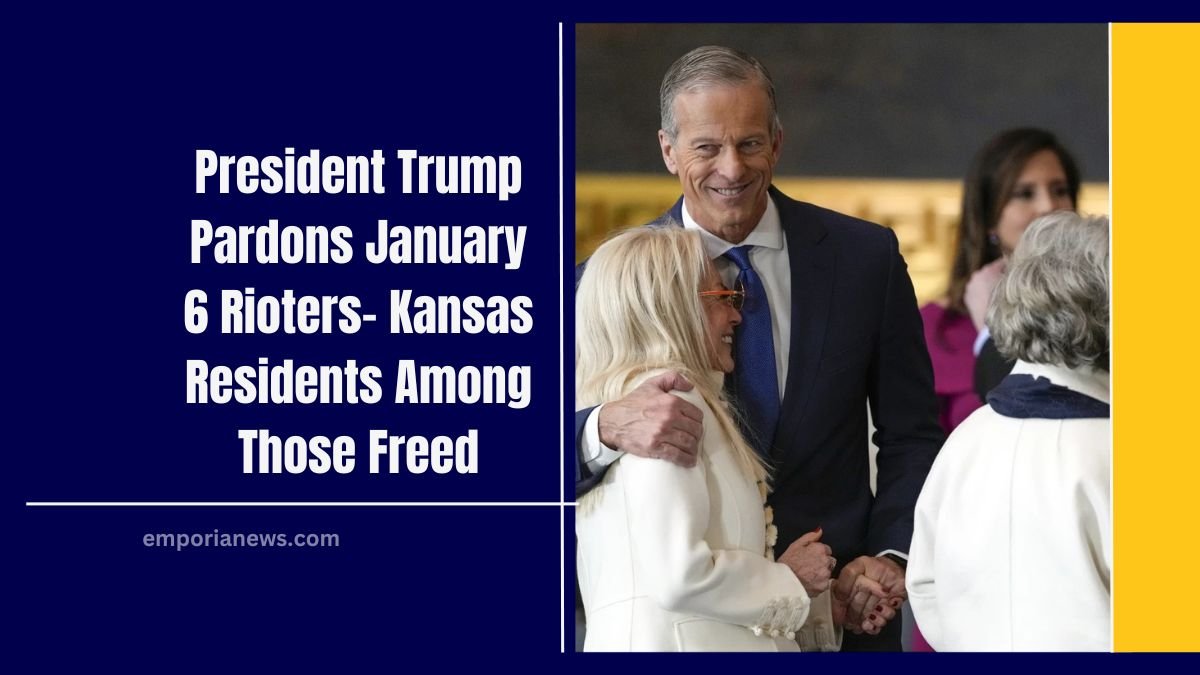On his first day back in office, President Trump issued a sweeping pardon for over 1,500 individuals involved in the January 6, 2021, Capitol riot, including several residents from Kansas.
This controversial decision has reignited discussions about justice, accountability, and the consequences of the Capitol insurrection.
Among those pardoned were 46 individuals from Kansas and Missouri, with six active cases dismissed by the interim U.S. Attorney.
Below, we explore the details of these cases, the charges, and the broader implications of the pardons.
The Kansas Residents Pardoned
1. William and Michael Pope (Topeka, Kansas)
- Charges:
- Civil disorder
- Obstructing an official proceeding
- Entering a restricted building
- Disorderly conduct in a Capitol building
William Pope had previously requested permission to attend Trump’s inauguration, a request that was granted. Both brothers were charged with significant offenses, yet they maintained their actions were non-violent.
2. Ryan Ashlock (Gardner, Kansas)
- Charges:
- Conspiracy and obstruction of official proceedings
- Trespassing in a restricted building with a deadly weapon
Ashlock, associated with the Proud Boys group, pleaded guilty in 2022 to a misdemeanor and received 70 days in prison, followed by supervised release.
His inclusion in the pardon list has sparked debates about whether his ties to extremist groups were adequately addressed.
3. William Chrestman (Olathe, Kansas)
- Charges:
- Threatening a federal officer
- Obstructing law enforcement
- Carrying a deadly weapon on restricted grounds
A U.S. Army veteran, Chrestman was a prominent figure among the Kansas City-area Proud Boys. He had been serving a four-year prison sentence when pardoned.
Details of the Capitol Insurrection
On January 6, 2021, thousands of individuals stormed the U.S. Capitol in an attempt to overturn the 2020 presidential election results. The event led to:
- Over 140 injuries to law enforcement officers.
- Widespread property damage to the Capitol building, estimated at millions of dollars.
- Charges against over 1,000 individuals across the U.S., ranging from trespassing to conspiracy and assault.
| Name | City | Charges | Sentencing Before Pardon |
|---|---|---|---|
| William Pope | Topeka | Civil disorder, trespassing | Pending charges dismissed |
| Michael Pope | Topeka | Civil disorder, trespassing | Pending charges dismissed |
| Ryan Ashlock | Gardner | Trespassing, carrying a deadly weapon | 70 days in prison, $500 restitution |
| William Chrestman | Olathe | Threatening federal officer, obstruction | Four years in prison, $2,000 restitution |
| Michael Eckerman | Wichita | Assaulting a federal officer, obstructing proceedings | 20 months in prison, $2,000 restitution |
| Jennifer Parks | Leavenworth | Parading, demonstrating in Capitol building | Probation, $500 restitution |
Controversy Surrounding the Pardons
The mass pardons have drawn mixed reactions:
- Supporters’ Perspective:
- Proponents argue the rioters were exercising their First Amendment rights and have been punished excessively.
- Trump supporters believe the pardons restore fairness, claiming the legal system disproportionately targeted them.
- Critics’ Perspective:
- Opponents view the pardons as undermining the rule of law and disrespecting law enforcement.
- Many point out the long-term damage caused by the riot, both physically and symbolically, to U.S. democracy.
Implications of the Pardons
The January 6 pardons could set a precedent for addressing politically motivated crimes. Legal analysts have raised concerns about the message this sends regarding accountability and justice.
Key Concerns
- Rehabilitation: Critics worry the pardons may embolden future unrest.
- Law Enforcement: The move has drawn backlash from officers injured during the riot.
- Public Sentiment: The pardons highlight the nation’s deep political divide.
President Trump’s decision to pardon the January 6 rioters, including Kansas residents, has sparked widespread debate about justice and accountability.
While some view the pardons as a gesture of compassion, others argue they undermine the rule of law and set a dangerous precedent.
The events of January 6 remain a stark reminder of the fragility of democracy and the importance of upholding its principles.
As the country moves forward, the focus must remain on fostering unity and addressing the underlying issues that led to such an unprecedented event.





I get it; Trump pardons Jared Kushners father, Biden pardons his son…but to actually pardon people with weapons storming the Capitol threatening to hang the then VP, Pence and assaulting police officers is abhorrent, and a disgrace…